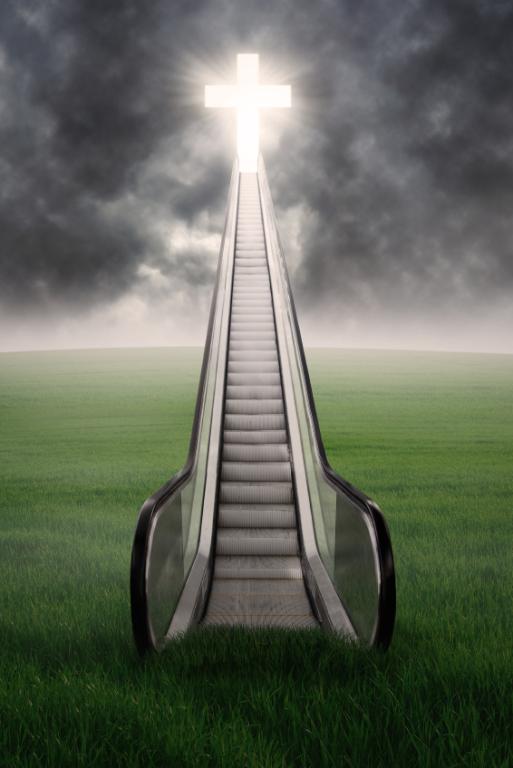 It has been said that the lyrics at the beginning of the song “Stairway to Heaven” refer to a woman who gets everything she wants and doesn’t give back. No matter how much money she has, no matter how much she accumulates, she will not get into heaven. Whether or not that is the true meaning of the opening lines to this mysterious song, what is true is that so many of us are trying to buy a stairway to heaven; in other words, we are often trying to rise up and secure our own salvation. However, no matter how hard we try we will always fall flat.
It has been said that the lyrics at the beginning of the song “Stairway to Heaven” refer to a woman who gets everything she wants and doesn’t give back. No matter how much money she has, no matter how much she accumulates, she will not get into heaven. Whether or not that is the true meaning of the opening lines to this mysterious song, what is true is that so many of us are trying to buy a stairway to heaven; in other words, we are often trying to rise up and secure our own salvation. However, no matter how hard we try we will always fall flat.
Do we try to buy a stairway to heaven (regardless of our conception of heaven) because we feel unworthy and are anxious about our eternal destiny? Is it because we possess self-confidence and believe we have the resources to make it on our own? Whether it is anxiety and despair on the one hand or pride on the other hand, we fail to see that entrance to heaven is not based on our ascent but the divine descent. What do I mean? Clutch the step or hold on to the wrung of the ladder you’re ascending and I’ll unpack what I mean.
Martin Luther realized the need for the divine descent a long time ago. The story goes that Luther climbed the Scala Sancta (Holy Stairs) during his visit to Rome. According to Roman Catholic tradition, these stairs were the steps on which Jesus walked at the time of his trial before Pilate (the stairs were supposedly brought from Jerusalem to Rome in the fourth century). In Rome, the steps lead to a chapel called Sancta Sanctorum (Holy of Holies). Over the centuries, pilgrims wishing to honor Christ’s passion have climbed the steps on their knees; some have hoped that through doing so they would acquire plenary indulgence (a plenary indulgence removes all the temporal punishment for sin).
Luther had supposedly climbed the stairs on his knees in the hope of being relieved of his burden in seeking assurance of God’s mercy and forgiveness. I can even imagine Luther kissing those steps. He would have kissed anything, tried anything to accumulate enough merit to make it to heaven. We are told that somewhere on his climb Luther realized that it is not our merit that saves us, but Christ’s merit and Christ’s descent from heaven. This realization led Luther to reference Jacob’s ladder and Jesus’ raising us to heaven.
In writing of Jacob’s ladder, Luther was alluding back to the biblical account where God appeared to Jacob at Bethel (the house of God) and to that account where Jesus claimed to be greater than Jacob. Jesus is our ultimate meeting place with God–he is Bethel: while Jacob saw angels ascending and descending on the staircase (Genesis 29:10-22), Jesus told Nathaniel, “Truly, truly, I say to you, you will see heaven opened, and the angels of God ascending and descending on the Son of Man” (that is, on Jesus; John 1:51).
In his reflections on Jacob’s ladder, Luther maintained that Christ descends to us from heaven and we ascend to Christ by faith as the love of God is poured out into our hearts. By no means does such an ascent by faith lead to escapism. Such faith in Christ and abiding in his love leads the believer to love his or her neighbor. For Luther, the believer does not exist “in himself, but in Christ and in his neighbor. Otherwise he is not a Christian. He lives in Christ through faith, in his neighbor through love. By faith he is caught up beyond himself into God. By love he descends beneath himself into his neighbor. Yet he always remains in God and in his love.” See “The Freedom of a Christian,” in Martin Luther’s Basic Theological Writings, ed. Timothy F. Lull (Minneapolis: Fortress Press, 1989), p. 623.
We can let go of the ladder now or quit clutching the stairs; the one from above will catch us. Otherwise, the cycle will continue: two steps up, three steps down. The further we climb on our own, the further and harder we will fall. We cannot help ourselves; our self-control and fixation with self-preservation will overwhelm us and make us lose our grip. In no way are we fit to help others, when we cannot even help ourselves.
Who will save us? Not someone from below like us, but someone who is from above who descends and brings us home (See John 8:21-30; 14:1-14). Only as Jesus descends and carries us up the ladder can we bear one another’s burdens and journey to our eternal home. Ramble on.













